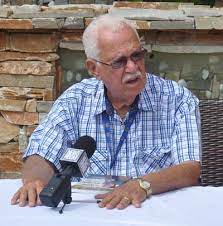 The 2025 Cricket West Indies (CWI) Annual Regional Four-Day Round Robin Tournament just recently concluded the fourth of its seven scheduled eight teams rounds. This year’s tournament has thankfully been blessed with some outstanding individual batting, bowling and fielding performances. There have been numerous centuries scored, an overly impressive number of multi-wickets hauls, as well as a fair share of stupendous catches.
The 2025 Cricket West Indies (CWI) Annual Regional Four-Day Round Robin Tournament just recently concluded the fourth of its seven scheduled eight teams rounds. This year’s tournament has thankfully been blessed with some outstanding individual batting, bowling and fielding performances. There have been numerous centuries scored, an overly impressive number of multi-wickets hauls, as well as a fair share of stupendous catches.
That’s the good news. The not so good news, is that CWI’s live television screening of all the matches played so far has to date been subject to arguably the worst commentary ever heard during a regional tournament. Some of the commentators have been so obviously lacking in their demonstrated knowledge of basic English grammar as to make even a primary school student ashamed.
In days long since gone by, before televised screening of regional matches became as prevalent as it is currently, radio commentary was the sole means by which Caribbean cricket fans could follow the encounters between the respective territorial teams. To even be chosen as a Cricket Radio Commentator a good command of English, articulate expression and to a lesser degree a pleasant enough sounding voice were, therefore, fundamental requirements.
So it was that we in the Caribbean became blessed with radio cricket commentaries from the likes of Barbados’ Tony Cozier, the Antiguan Jack Matthews, Guyana’s Reds Perreira, the Trinidad & Tobago duo of Tony Williams and Raffie Knowles, as well as Jamaica’s Croskilll brothers Hugh and Simon. Just to name a few.
These gents relayed their respective cricket commentaries in such an excellently descriptive manner that we as listeners were made to feel as if we were also actually there at the ground itself. Not miles away instead and merely connected by means of radio technology.
There were back then also some Comments men of the highest possible quality. Mostly former West Indies players: the likes of Barbados’ Everton Weekes, Trinidad’s Jerry Gomez and Jamaica’s Jackie Hendricks. Guyana’s Fred Wills, though not himself a former West Indies player, was also another whose name warrants inclusion on any such list of the most excellent Comments men the region has ever produced.
In later years, when the involvement of entities such as Sky TV and the International Management Group allowed Caribbean hosted Test matches to be afforded widespread live television coverage, there were others who then came to the fore. The great Jamaican former West Indies fast bowler Michael Holding, will now forever be remembered as having become, arguably, even more internationally acclaimed and admired as a television cricket commentator than he ever was as a player. Such was the degree of excellence that his tv cricket commentary epitomized!
To a somewhat similar degree, Holding’s former West Indies fast-bowling teammate, the Trinidad-born Ian Bishop has since become one of the world’s most popular tv cricket commentators. Almost without fail, Bishop’s name is now among the very first to be included on any television commentary panel for international tournaments. He has by now perhaps covered even more International Cricket Council (ICC) tournaments than any other currently active commentator.
Back home in the Caribbean, in addition to Holding and Bishop, there was also the Barbadian lawyer Donna Symmonds refreshingly breaking ground as the very first female voice to be heard as a cricket tv commentator. Symmond’s most admirable barrier smashing endeavors paved the way for others such as her fellow Barbadian Alex Jordan to follow in her footsteps with her own brand of refreshingly excellent cricket tv commentary. The former West Indies Women’s cricketer, Stacy-Ann King, is another who has since risen to deserved prominence as a much admired and well respected tv cricket commentator.
On the male side of the gender pool, Fazeer Mohammed, Tony Gray, Jeffrey Dujon and Sir Curtly Ambrose are among those whose television cricket commentary can also be described as most worthy listening. Except for a mere handful of notable exceptions though, unfortunately the same cannot now be said of the current crop of so called cricket commentators.
Except for his somewhat annoying tendency to become overly excitable whenever something noteworthy happens on the field whilst he’s on air, such as a boundary being struck or a batter’s dismissal, Barbados’ Andrew Mason’s self-ascribed claim to be the regions very best cricket commentator is arguably well justified. Mason’s on-air voice ranks right up there among the very best ever heard within the region. His knowledge of the game and the articulate manner by which he describes what’s happening on the field are also always of the highest quality.
During this years Barbados-hosted Regional 4Day matches, Mason was often joined on commentary by his fellow countryman, the former England Test cricketer Roland Butcher, in a pairing that made for most enjoyable listening. Butcher’s impressive knowledge, as indicated by his invariably insightful comments, being as equally delightful as Mason’s non-excited commentary.
Trinidad’s Vinode Manchan, who reportedly was responsible for pulling together the commentary panels for CWI’s television screening of the respective matches, is another whose on-air delivery has been most admirably excellent. Much the same can also be said of his fellow Trinidadian Colin Murray.
Apart from those aforementioned, Guyana’s Sean Devers is among the very few other commentators who would now be deserving of even a passing grade. Devers’ command of the language is at least highly commendable.
Devers’ only noticeable faults are his far too often prevalent inclination to talk about his own former playing days representing Guyana, as well as a tendency to sometimes gravely err when relaying historical events. He once erroneously suggested that Jeffrey Dujon had taken over the West Indies Test wicket-keeping duties from Trinidad’s David Williams. It was in fact Barbados’ David Murray who Dujon eventually replaced as the West Indies wicket-keeper batter.
Even more shocking was his grave error while on air of having identified Sir Frank Worrell as the then British Guiana based Bookers sugar estate employee who had discovered and unearthed Rohan Kanhai, Basil Butcher and Joe Soloman as eventual Guyana and West Indies players. As anyone with even the most rudimentary knowledge of West Indies cricket’s illustrious history would well know, it was Worrell’s fellow Barbadian threeW’s teammate Clyde Walcott who had actually made that most fortuitous discovery.
For all his very minor faults, Devers’ commentary has nevertheless stood head and shoulders above that of his fellow Guyanese Regional 4Day Commentators. At least one of whom has seemed to be utterly lacking in his basic understanding of the difference between a noun and a verb. Invariably using the verb deliver when he should instead be using the noun delivery. “That was a very good deliver, pitched on a perfect outside offstump line!” Such repeated utterances that would again make even a primary school English student cringe.
If some of the commentary from Guyana was bad, then that which was provided by at least one of the Jamaican commentators was appallingly even worse. So much so as to be awarded the most deserving description as some of the worst cricket commentary to have ever graced regional airwaves. Including that of one particular Commentator who seemed to be wholly incapable of uttering even a single sentence that wasn’t inclusive of the most basic grammatical errors. When to use has instead of have; “he’s batting responsible,” instead of responsibly were just some seemingly inevitable gaffes that would have left even the most tolerant of listeners cringing uncontrollably.
Within the past few years there was sadly been much undeniable evidence of mediocrity having unfortunately become the acceptable norm in far too many aspects of West Indies cricket. From players not taking responsibility for the further development of their own game, to paper qualified coaches seemingly incapable of identifying, let alone correcting, the most blatantly obvious technique flaws of cricketers under their charge, to administrators who are demonstrated examples of functional incompetence. Based on what has been presented as acceptable commentary during this year’s Regional 4Day tournament to date, it seems that such mediocrity has since also become prevalent among some of the tournament’s television streaming panels. Yikes!
